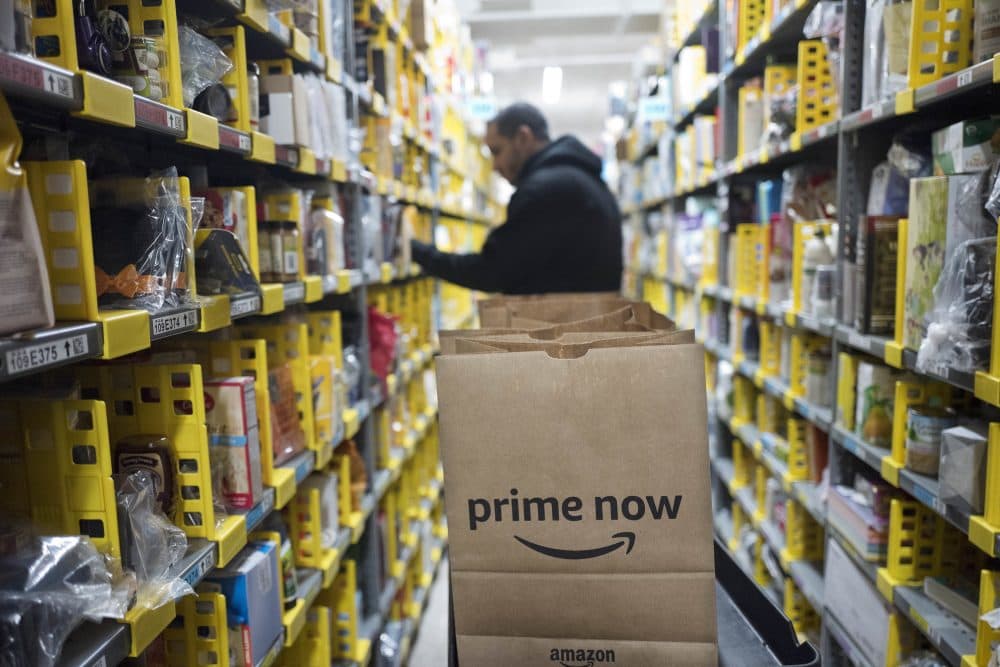Advertisement
Commentary
Boston's Bid For HQ2 Overlooks Amazon's Awful Labor Practices

Everyone who’s someone in Boston wants to be Jeff Bezos’s friend.
Go look at our Amazon HQ2 bid and see for yourself.
The city of Boston’s official pitch begins with a series of fawning invitational letters to Bezos, the CEO of Amazon and, according to CNN, the wealthiest man to ever live. The roster of letter writers behind these testimonials reads like a roundup of Boston’s most illustrious individuals and brands: Marty Walsh, Katherine Clark, State Street, General Electric, DraftKings, nearly all of our local colleges — even Trillium Brewing is on the list.
As you read these letters, you start to see one idea emerge. Most of the letter writers reason that Boston would be the perfect nesting ground for the HQ2 because Boston is an innovative city and Amazon is the embodiment of innovation. It sounds logical and exciting on paper: our “wicked smaht” city hosting the biggest digital commerce powerhouse in history. But there’s a substantial omission in this feel-good narrative that makes you wonder who exactly Boston leaders are thinking about—or ignoring—when they lavish Amazon for its “innovative” ways.
That omission is Amazon’s labor practices, which are awful.
They’ve also been exhaustively documented.
What you see in the Amazon warehouses is a culture of industrialized brutality ...
Let’s start with an inside look at the Amazon warehouses, since we’ll probably be getting at least a few more of those if Bezos decides to set up shop in Boston. Over the past decade, it’s been established by undercover journalists and former Amazon employees that warehouse workers tasked with fulfilling customer orders often walk more than 10 miles a day, as they fetch items, box them and send them off. Their toilet breaks are timed, their shifts routinely range from dawn till dusk, and sitting is often forbidden. They aren’t even paid competitively. As The Economist recently explained, an Amazon warehouse worker’s annual wages can fall as much as 30 percent below the national average for warehouse staff.
What you see in the Amazon warehouses is a culture of industrialized brutality in which the worker isn’t a human with attendant needs, but a body that exists to be utilized until it’s too broken or too spent to be productive anymore. But this culture doesn’t just apply to Amazon’s manual labor workspaces. It goes all the way to the executive level.
In the summer of 2015, the New York Times published a highly trafficked story about what it’s like to be one of Bezos’s white-collar employees. Many of those interviewed described an atmosphere of fear, unmitigated stress and hostility: a workplace where employees are habitually belittled and abused by their managers, encouraged to throw colleagues under the bus for trivial mistakes and where work often takes precedence over weekend activities or family obligations or bouts of illness.
Perhaps most disturbing of all, however, is that the severe conditions blue and white collar Amazon workers endure are enough to trigger serious health problems.
A few years ago, it wasn’t uncommon to read about exhausted Amazon employees collapsing on the warehouse floor or succumbing to panic attacks. That sort of incident often led to the worker being fired and replaced with someone fresher and more supple. It's as coldly transactional as tossing away a used lint roller.
Today, you don’t encounter many articles detailing Amazon’s grueling and cruel work culture: not because anything has improved for Amazon’s employees, but because when their suffering was the subject of media inquiry just a few years ago, it wasn’t upsetting enough to register.
It seems Americans decided that treating workers abhorrently is just “Amazon being Amazon.” A necessary evil of a big business that’s too entrenched to be helped.
But it doesn’t have to be that way.
The one place where you will find consistent coverage of Amazon’s labor practices is in the European media. Across the pond, the Amazon way is being challenged by unions and governments that believe workers deserve better. This is something that American states and cities can emulate.
It seems Americans decided that treating workers abhorrently is just “Amazon being Amazon.”
One creative idea from The Intercept’s Zaid Jilani goes like this: All of the U.S. cities still competing for the HQ2 could join forces and collectively bargain with Amazon for a deal that would better comply with local labor laws and wage standards. An approach like this would radically shift the balance of power in the Amazon HQ2 bidding war to the advantage of all the ordinary working people who live in the winning city, and ultimately the people who could soon find themselves packing Amazon boxes or creating PowerPoints for regional manager meetings.
All of the Boston leaders behind the Amazon bid are correct in framing the HQ2 deal as an “opportunity.” But for whom? If Boston’s rationale for hosting Amazon is truly as noble as creating jobs and prosperity for our local workforce, then Amazon’s labor practices cannot be ignored any longer. Instead, Boston must seize the opportunity it now has — as an HQ2 finalist — to lay down some terms for how local workers must be treated if Jeff Bezos picks our city.
Not only would this be morally courageous, but it would be innovative too.
